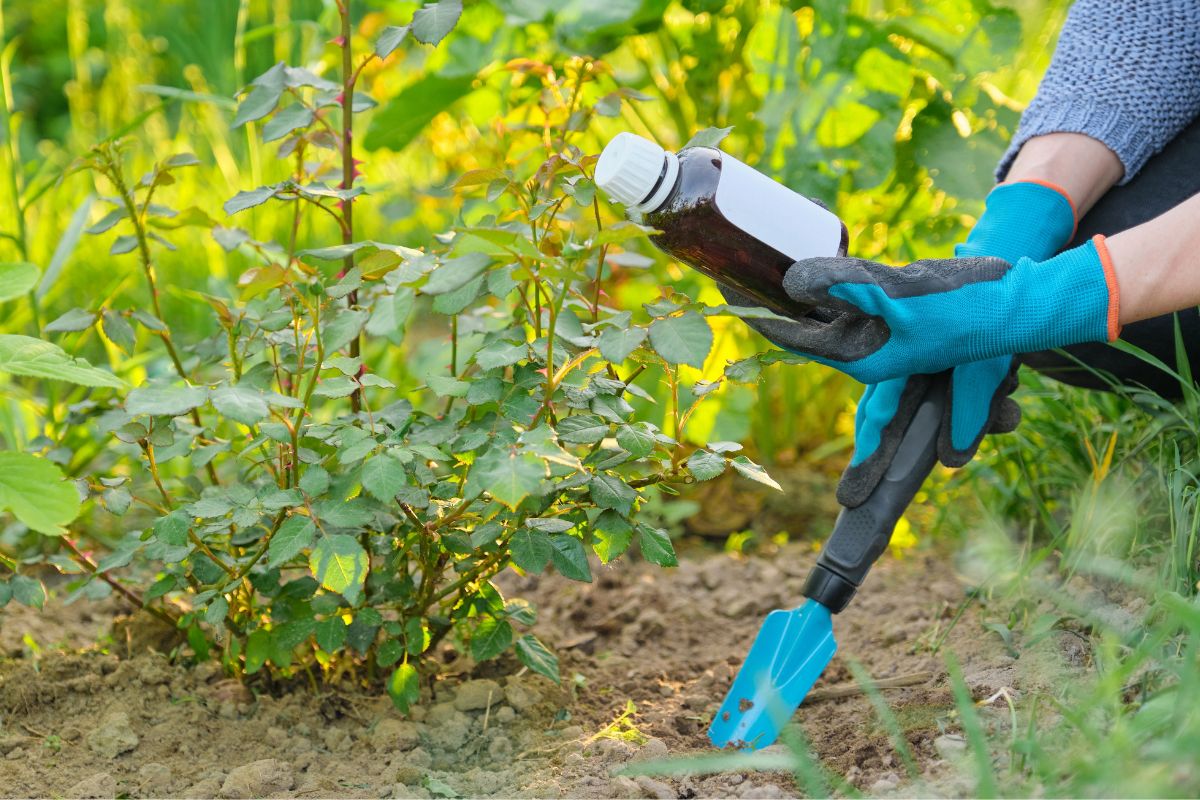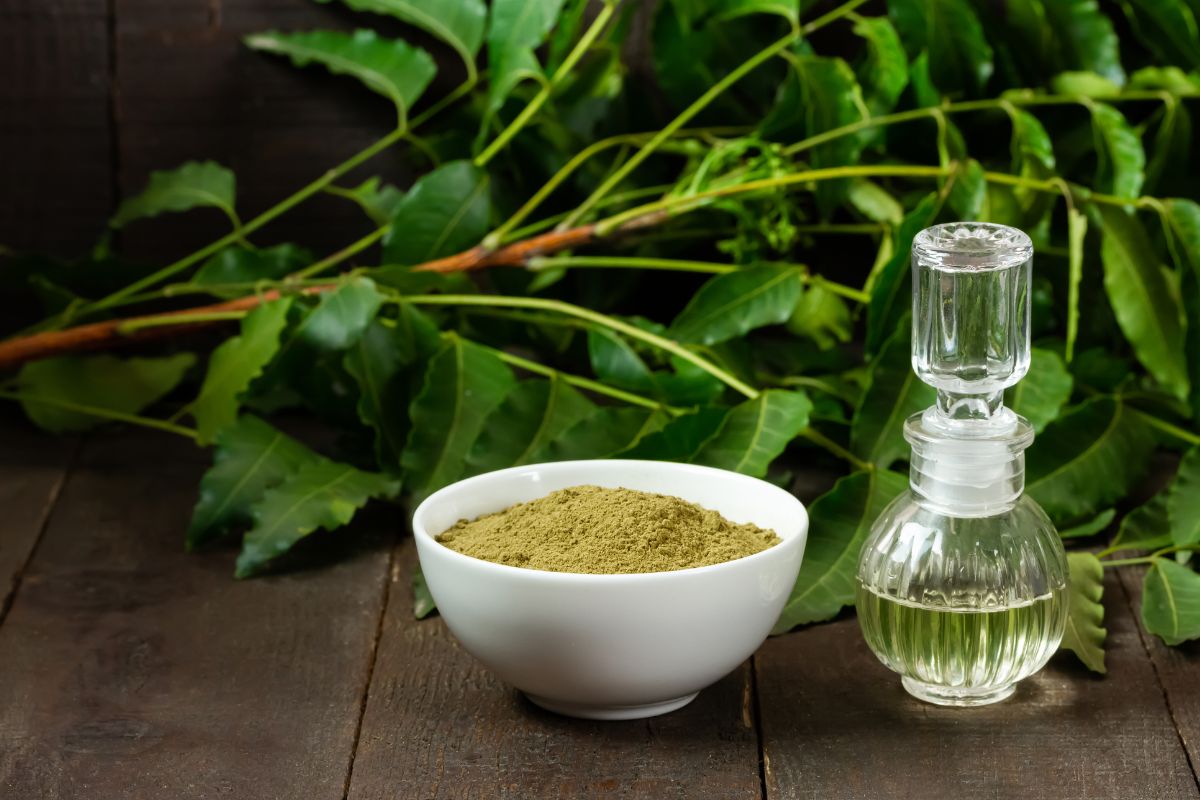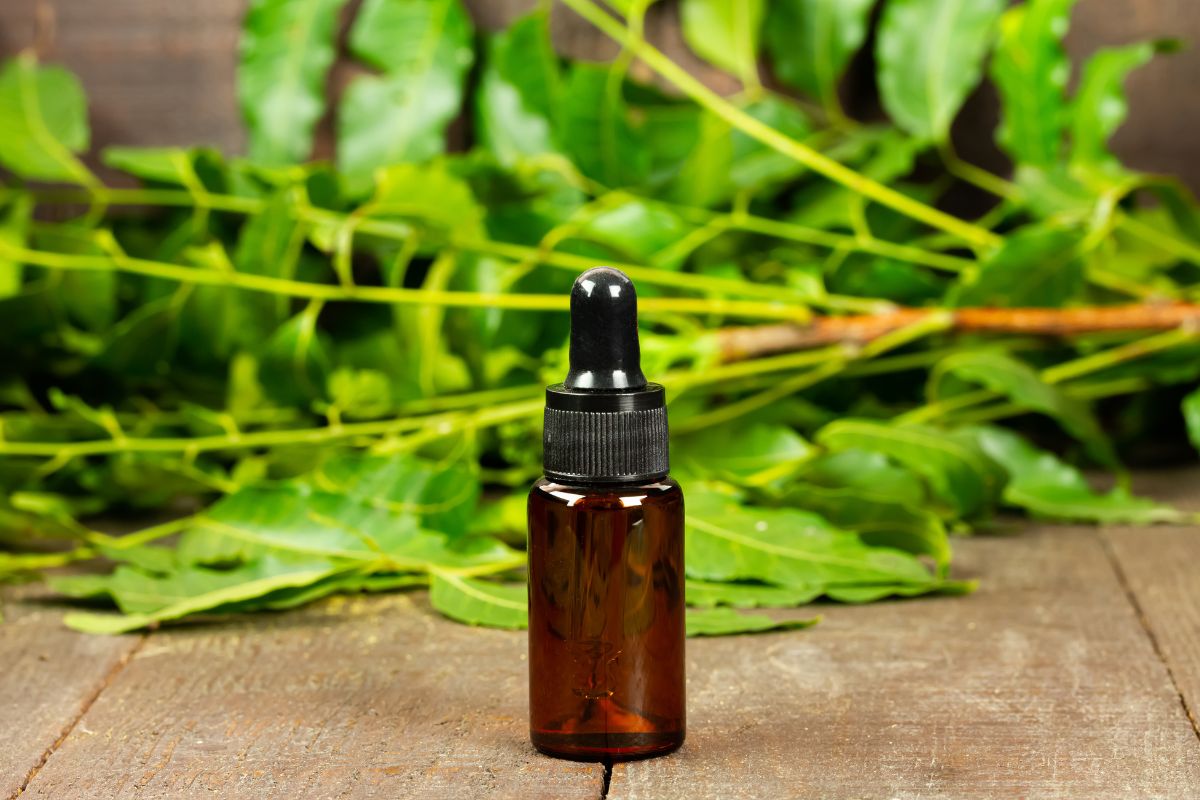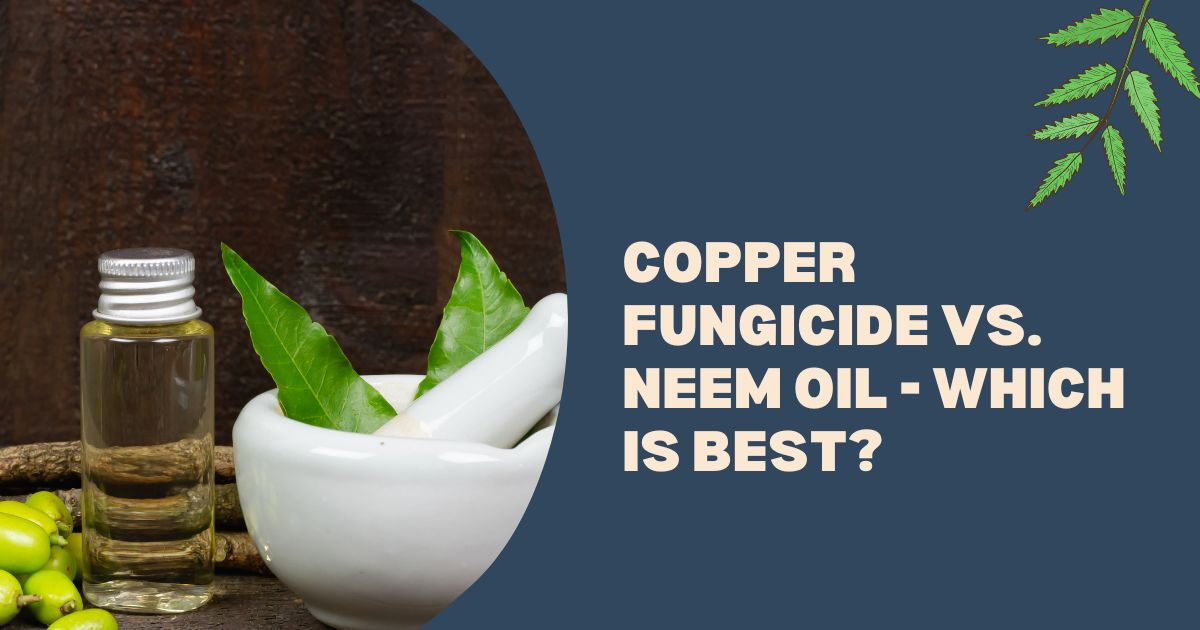Natural Pest Killers
When it comes to protecting your plants from pests and diseases, the topic of copper fungicide vs. neem oil is important to any grower.
Fungi and pests affect your plants and can be a real problem, and you need to be able to prevent the infection and heal your plants if they are already infected.
Using the correct product is, therefore, essential for the longevity and health of your plants.
What is Copper Fungicide?
Copper fungicide is a product that contains copper sulfide and other additives used to prevent the growth of fungi in your plants. Copper fungicide effectively prevents your plants from being infected by fungi such as black spot, powdery mildew, septoria leaf spot, and anthracnose. Copper fungicide is a preventative treatment and will not cure already-infected plants.
Copper fungicide is not recommended for organic farming, although farmers can use it in their gardens when it’s the only solution. Organic farms can still use copper fungicides if they follow the guidelines to prevent the copper from accumulating in the soil, a controversial topic amongst organic farmers.
Before using fungicide with copper, identify the disease affecting your plant. Then, determine whether the condition is in its early or late stages, as the application of copper fungicide when the infestation is full-blown will not work. Copper fungicide is not suitable when minor spots appear on the leaves; rather, remove the leaves that appear infected and monitor them closely.
Copper fungicide is suitable for indoor plants and vegetables such as tomatoes and fruit. However, copper fungicide is not ideal for copper-sensitive plants such as ivy and seasonal geraniums.
Take your indoor plants outside to apply copper fungicide and fully dry them before bringing them back indoors.
Copper fungicide is also a fertilizer and will improve the soil conditions for copper-deficient soils. Copper is necessary to produce nutritious, juicy, tasty vegetables and fruits.
Copper Deficiency in Plants
Copper sulfate, contained in copper fungicide, can have positive or negative effects depending on the soil condition and its use. Copper-deficient plants will not be able to produce, causing the leaves to turn yellow, a condition called chlorosis.
Other symptoms of copper deficiency are stunted growth, delayed or absence of flowering, wilting, low fruit production, and death of new plants. In grain plants, the leaves will turn brown, which will resemble but not be confused with frostbite. In other plants, the tips of the leaves turn bluish-green and wilt.
Soils likely to be copper deficient are peaty, acidic, or those with high alkaline content with pH levels above 7.5. Soils with high quantities of organic matter that have not decomposed will have low copper sulfate levels. However, once the organic matter has decayed, it should produce enough copper and not cause copper deficiency.
To increase copper in your soil, apply copper dust to plants using the soil drenching method. A foliar spray is good for keeping the plant healthy, but treating the soil requires a more intense approach.
It is important to follow the instructions and guidelines when soil drenching to avoid introducing toxic levels of copper into your soil.
When treating the soil for copper deficiency, you need to test the soil constantly and apply fertilizer as a long-term plan because you do not want to poison the soil.
Copper Toxicity in Plants
Copper sulfate fungicide applied in excessive quantities can be problematic and affect your soil, groundwater, and plants.
Toxic levels of copper will cause iron deficiency in plants as they cannot produce chlorophyll. The symptoms will present as leaves that turn light green or white. In some cases, the roots are also affected, which will look small and have a barbed appearance. Damaged roots will result in slow growth, wilting, or even death of the plant.
Copper fungicide toxic levels in fruits will affect their sugar production, causing them to be watery. When copper levels are excessive, conductivity highly affects the sugar concentration and flavor of the fruits.
Some plants whose taste will be affected by toxic levels of copper in the soil are blueberry, tomato, watermelon, onion, parsnip, lettuce, beet, carrot, cabbage, eggplant, celery, and spinach.
Copper fungicide toxicity to the soil is severe as it is hard to reverse the effects.
If the soil has high levels of copper, you will need to stop applying copper fungicide and introduce phosphorus and zinc. You can use neem oil fungicide as it is compatible with a copper fungicide to help introduce NPK, which contains nutrients for fertilizer.
Regularly adding organic matter to the soil will prevent and reduce toxic levels of copper and improve your soil.

What is Neem Oil?
Neem oil, also known as margosa oil, is an extract from the seeds and fruit of Azadirachta indica, known as neem. Originally from South Asia, the plant has been introduced in many tropical countries.
Neem oil’s key ingredient is azadirachtin. The content will vary between 300 to 2,500 ppm of azadirachtin, depending on the manufacturer; the higher the content of azadirachtin, the better the neem oil. Neem oil prevents the growth of fungicides and other bacterial diseases. Neem oil is a solution to treat plants that have already been affected and also to improve the fertility of your soil.
Neem oil is an organic fungicide that is biodegradable and is popular in organic farming for the management of pests and diseases and fertilization of the soil.
Neem Oil as a Pesticide
Neem oil disrupts the laying of eggs, preventing larvae development and deterring feeding on plant foliage. Neem oil is poisonous to insects in all stages of growth, inhibiting their ability to swallow.
Neem oil will disrupt the pests at any point of their life cycle, stunt their growth, and they will eventually die before they can manifest further. The taste and smell are unbearable to pests causing them to migrate to other areas for food and basic survival.
Neem oil comes in various colors and has a strong, pungent smell of garlic and peanut, making it a natural pesticide. Neem oil is effective against over 200 types of bugs, including:
- Aphids
- Whiteflies
- Scale insects
- Thrips
- Fruit flies
- Colorado potato beetles
- Fleas
- Mosquitos
- Japanese beetles
- Various types of caterpillars
- Fire ants
- Weevils
- Squash bugs
Neem Oil for Fungal and Bacterial Diseases
Neem oil is a natural fungicide that is an organic treatment plan for fungal diseases such as powdery mildew, leaf spot, tip blight, black spot, and scabs.
Neem oil will eradicate bacterial diseases such as fire bright, which causes leaves to wilt and decay.
Neem Oil as Fertilizer
Neem oil contains fertilizer elements, namely nitrogen, phosphorus, and potassium (NPK). Neem oil is safe for hydroponic systems as it is an organic product.
When mixed with soil, neem oil produces organic acid, reducing soil alkalinity that helping the plants to have the necessary nutrients for healthy growth.
Neem oil contains macro and micronutrients released slowly to the soil allowing the plants sufficient time to absorb the nutrients resulting in healthy plants. Read our article and find out Neem Oil For Tomatoes – What Are The Uses?

Copper Fungicide vs. Neem Oil – The Differences
Copper fungicide and neem oil are both used for plant and pest management in the prevention of fungicide and bacterial infections in plants. The similarities between copper fungicide and Neem oil are as follows.
- Both copper fungicide and Neem oil can damage foliage if applied in hot weather. Both products should be used in low temperatures, either early or late in the day, especially when bees are present.
- Copper fungicide and neem oil are suitable for preventing fungal and bacterial infections in your plants.
- Both copper fungicide and neem oil will improve the fertility of the soil. Applying copper fungicide where the soil has a copper deficiency will improve copper content in your soil, and neem oil contains NPK, fertilizer nutrients that enrich your soil.
While copper fungicide and neem oil have a few similarities, there are much more differences in how they function and their impact on the environment. Here are the differences between the two products.
- Copper fungicide is a mixture of copper and other elements, while neem oil is an organic product extracted from a plant.
- Copper fungicide is a preventative solution to fungi, while neem oil can prevent the production and growth of fungi and treatment plants that are already infected.
- Copper fungicide does not dissolve and will eventually contaminate the soil and groundwater, which can be detrimental to the growth and development of plants and other living organisms. Neem oil is organic and easily absorbed into the soil and will not permanently stay in the ground or water.
- Neem oil degrades faster when directly in contact with the sun, while copper fungicide does not degrade as fast.
- While both copper fungicide and neem oil improve the fertility of the soil, copper fungicide is only suitable for soils that have a copper deficiency. In contrast, neem oil is a more balanced fertilizer as it contains nitrogen, phosphorus, and potassium, the three nutrients that complete fertilizer.
- You need to reapply copper fungicide and neem oil at least every seven days until the infection subsides; however, carefully applying copper fungicide can harm the soil and the environment.
Is Copper Fungicide Safe for Humans and Animals?
The answer to the question of whether copper fungicide is safe for humans and animals is yes. It is widely used by farmers worldwide in agriculture, horticulture, and floriculture. However, copper fungicide is mildly toxic if not used correctly and should be applied strictly to the instructions on the label.
Copper fungicide is suitable to use around animals, however, do not spray directly into them or their food.
In a case where you have bees, spray copper fungicide late in the day when the bees are not looking for food or pollinating.
Some of the brands of copper fungicide are so toxic you have to wait at least two weeks if the plant or fruit is for consumption.
Copper fungicides can irritate the skin, so wear protective gear such as gloves, goggles, and masks when handling and applying. In addition, thoroughly wash hands after contacting and using copper fungicide.
Is Neem Oil Safe for Pets and Their Owners?
Yes, neem oil is safe for pets and their owners as it is an organic product. Its composition is non-toxic but must be applied correctly to avoid irritation.
You can eat fruits and vegetables sprayed with neem oil on the same day as the application; however, wash thoroughly before consumption.
It is also a safer fungicide as it is biodegradable, thus not harming the soil, water aquifer, and the rest of the environment.
When mixing and spraying neem oil, wear protective gear such as goggles, masks, and gloves, as it can irritate when in contact with the skin.
Some people can experience dermatitis when they come into contact with highly concentrated neem oil. In case of accidental consumption, a person may experience gastrointestinal inflammation symptomized by stomach cramps and diarrhea, which should wear out within a day or two.
Does Neem Oil Kill Fungus?
Neem oil is an anti-fungal for your plants and will prevent fungus growth before it develops on your plants. It will kill fungi in its early stages on infected plants and restore their health.
Neem oil will also prevent the growth of fungi when applied early.
How to Use Copper Fungicide
Copper fungicide, which comes in ready-to-use form, is applied like a foliar spray weekly or every ten days, depending on the copper content of the soil, until the infection disappears.
Some copper fungicides will come in concentrated form, which you must dilute in water as per the instructions, then spray on the leaves. Copper fungicide application should be when anticipating dry weather for at least 12 hours after application and not in extremely low temperatures.
When using a copper fungicide, pay attention to the manufacturer’s instructions on temperature limits and dosages, as spraying incorrectly may not work or could destroy your plants, soil, and other necessary organisms.
Copper fungicide is suitable for fruit trees 7 to 10 days before harvest. Spraying should start in the fall or when leaves emerge. For new plants, copper fungicide application is best when planting or when they budbreak.
Copper fungicide is also suitable for indoor plants. Begin by removing all infected areas, then leave the plant to dry in a nicely aerated room. Then take the plant outside and spray the leaves, and wait for the plant to dry before bringing it back inside. Repeat the application process as required.
For effectiveness, keep infected plants separated from healthy plants and wash all tools after use to avoid cross-contamination.
Copper Fungicide Pros and Cons
Copper fungicide has been used for centuries to prevent fungicide growth and as fertilizer for plants. There are advantages and disadvantages to using a copper fungicide. Here are the pros and cons when considering using a copper fungicide for your garden.
Pros
- Prevention is better than cure, and you want to catch those diseases before they do any damage. Copper fungicide prevents the growth of fungal infections in your plants.
- Copper sulfate, contained in the copper fungicide, will enrich copper-deficient soil.
- There is a variety of copper fungicides that can be used even on the day of harvest that will improve the quality of your fruits, making them juicier and tastier.
Cons
- High amounts of copper fungicides will kill cells and result in scorched leaves and will cause the leaves not to produce chlorophyll, which can result in stunted growth or death of the plant.
- High amounts can be toxic to humans, pets, and other important organisms such as bees.
- Copper fungicide is not biodegradable and will eventually contaminate your soil and underground water, causing iron deficiency in the plants and resulting in reduced seed germination and general plant health. It is very hard to reverse the effects of soils contaminated by copper.
- While copper fungicide can improve the taste of fruits, huge amounts can cause the fruit to be watery and tasteless.
- Some bacteria strains, such as fire blight, are resistant to copper fungicides.
How to Use Neem Oil
Neem oil is an organic fungicide for plants in concentrated or diluted form. Diluted products have low neem oil content; thus, we recommend you dilute your mix for better value.
The advantages of diluting your neem oil are.
- Pre-diluted mixes are not always readily available.
- You can adjust the potency of azadirachtin based on the infestation.
- The prediluted mix is much more expensive than the homemade mix.
How to Make Neem Oil Spray
To make a neem oil spray, you will need three ingredients: Neem oil, liquid Castile soap (used as a binder), and warm water. Mix two teaspoons of neem oil and one teaspoon of liquid soap with 1 quart (1 liter) of warm water. Pour the ingredients into a spray bottle and shake vigorously to combine them.
To make a stronger solution in case of a widespread infestation, double the quantities of neem oil and Castile soap.
How to Use Neem Oil
While wearing protective wear, spray the mixture on the top and the underside of the foliage paying attention to all the crevices where pests would hide. Neem oil is not toxic, and therefore you can also spray it onto the soil to engage the soil quality and prevent nematodes.
Use a weaker solution weekly as a preventative measure but a strong solution twice a week if you have a pest infestation in your garden until it disappears.
You can spray as much as possible in your garden as an excessive volume of neem oil will not damage your plants, ensuring the whole garden is covered.
You can dispose of the leftover solution or use it for soil drenching, as it will not contaminate the water. The elements in neem oil will start breaking down after 8 hours, dissolving into the soil, making it ineffective. You can spray neem oil even on the day of harvest.
Spray neem oil during low temperatures, especially during the morning and evenings, to prevent damage to the leaves.
What are the Pros and Cons of Neem Oil?
Neem oil is an organic fungicide, and here are the pros and cons of choosing neem oil for your garden.
Pros
- Neem oil helps protect plants from getting infected with fungi and bacteria.
- If the plant is already infected, neem oil will be the treatment management plan by applying a stronger mixture more frequently until the infestation has disappeared.
- Neem oil is effective for over 200 species of insects, including aphids, caterpillars, mites, and leafhoppers.
- Neem oil is biodegradable and will not infect your soil or pollute groundwater.
- It is safe for pets and other valuable insects such as bees and suitable for indoor and outdoor plants.
- Vegetables and fruits sprayed with neem oil are safe for consumption on the same day of harvest. Vegetables and fruits have to be washed thoroughly before being consumed.
- Neem oil is good for the soil as it contains nitrogen, phosphorus, and potassium (NPK), which are the main components of fertilizer.
- Earthworms and other organisms that help in the aeration of the soil get their nutrition from neem oil when used on the soil.
- Neem oil helps eliminate parasitic nematodes that could destroy your garden. Neem oil will eliminate pests at any stage of their development, whether egg, larvae, or fully developed.
- Neem oil does not destroy bacterial components that are beneficial to the soil.
- Neem oil is also a great mosquito repellent due to its smell, which most insects find repugnant.
- Neem oil comes in various forms, including granules, wettable powders, dust, and emulsified concentrates.
- Unlike synthetic fungicides, pests will not become resistant to neem oil despite multiple applications.
- Neem oil will improve the overall health of your plants.
Cons
- Neem oil can cause contact dermatitis if it comes in contact with the skin, thus must be handled with care.
- While it is safe on fruit trees and edible vegetables, it can cause an allergic reaction if consumed directly.
- Neem oil works directly on smaller insects, but larger insects will have to chew leaves and other parts of the plant to be effective, which can slow down dealing with the infestation.
- Heavy and excessive application of neem oil can cause clogging, damaging the leaves.
- Neem oil breaks down much faster, within 8 hours which may render it ineffective.

Soil Drenching
Soil drenching is applying chemicals to the soil, such as fungicides, pesticides, and nutrients, for quick delivery and faster effective results. Copper fungicides and neem oil are safe for soil drenching. The roots are the delivery point, and then the solution travels up to the rest of the plant.
Soil drenching is the best way to apply pesticides to your plants when insects and fungus gnats infect the soil. Soil drenching is a perfect way to use a fungicide when the soil and roots require treatment. Copper dust for plants is best for soil drenching where there is a need to treat copper-deficient soil.
Copper fungicide is not good for soil drenching in healthy soil because it does not break down and will contaminate the soil and groundwater.
Things to consider before you do a soil drench are the size of the garden and the frequency you will need to do the soil drench.
Soil drench must be applied to the topsoil at least every two weeks and in copper fungicides strictly by instructions on the label. The garden must be watered consistently after a soil drench to help distribute pesticides to the other parts of the plant.
While soil drenching is effective, some farmers have noted that it changes the taste of the vegetable or fruit. It is also known to cause soil toxicity, especially when using copper fungicide.
Final Verdict
Copper fungicide as a pesticide and fertilizer spans centuries. It is best for preventing the development and growth of fungal and bacterial diseases. Once the infection has manifested, copper fungicide is no longer a viable option. Copper fungicide can cause toxicity to the soil if applied excessively.
Neem oil has also been used for a long time and is an organic solution to pests, fungi, and other infections in your plants at any stage of their life cycle. Neem oil is fertilizer and will break down over time without contaminating the soil or water.
While neem oil may not last long once applied, it is a better and more environmentally friendly solution for plant pest and disease management.
